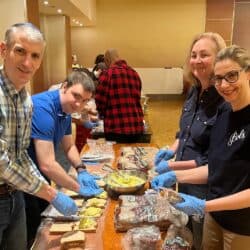I have worked in the field of organized philanthropy in Canada for close to 20 years. Over two decades we have built Philanthropic Foundations Canada (PFC) as a platform which now serves more than 130 members.
Our goal is to challenge funders to do their best work, including making social change. PFC serves the broader community of organized philanthropy, not only its members. The consistent thread in PFC’s evolution since 2008 has been the need to serve the whole field of organized grantmakers. Most of its events, learning materials, and web content are publicly available.
In 2017, we adopted a new message: Connecting. Inspiring. Creating Change. With this message, we wanted to move with the times and adopt a more assertive identity: “We seek to support our members and organized philanthropy by encouraging public policies that sustain the sector, by increasing awareness of philanthropy’s contribution to the well-being of Canadians, and by providing opportunities for funders to learn from each other.” [1]
Even with our revised message, there is remarkable consistency between the approach of PFC 20 years ago and today. What has changed is our language and, more fundamentally, our realization that PFC is not only a member service organization but also, with the credibility and the continuity of its relationships, a leadership organization for organized philanthropy.
Building a community: The impact of PFC
PFC’s impact on the world of organized philanthropy in Canada over a period of 20 years can be summed up best as community-building. Before 1999, many private foundations knew and interacted with each other informally and locally, particularly in anglophone Canada. But there was little formal collaboration and no capacity for a collective expression. There was also no formal vehicle that enabled other organizations in the charitable sector to interact with private foundations on a broader policy level.
PFC created many of these linkages, including, importantly, the linkage of Quebec-based philanthropy to the strategies and actions of organized philanthropy in the rest of Canada. PFC’s physical presence in Montreal and its commitment to bilingualism have connected francophone foundations to each other and to anglophone foundations beyond Quebec. This has been an important factor in building and sustaining a pan-Canadian community of philanthropy.
The existence of PFC has meant multiple opportunities for engagement for many foundations. Since 1999, more than 60 different foundations have had representatives serving on the Board or committees of PFC. At annual conferences and leadership retreats, the board and staff of foundations have come to know each other and to learn more about the broader field in which they work.
Instances of collaborative activity are multiplying because of this exposure. Among these are: the development of Foundation House in Toronto by three PFC members who connected through their shared membership; the creation of The Circle on Philanthropy and Aboriginal Peoples in Canada, which emerged from a table conversation at the 2009 PFC Conference in Calgary; the emergence of other funder affinity groups such as the mental health and wellness funders group; and the Collective Impact Project in Montreal, bringing together seven private foundations. The role of PFC in these collaborations has been indirect but essential. PFC events and introductions created the trust that allowed many of these activities to be initiated by the members.
The professionalization of the field can be linked to the guides, workshops, survey reports, and learning events sponsored by PFC and produced either by members or by advisors and experts engaged by PFC. Canadian examples, cases, and legal frameworks are all highlighted in this content.
PFC has been highly instrumental in providing structured learning. In 2012, we began to organize a biannual series of one-day practice-focused gatherings. As an overarching theme, PFC has examined what it takes to “make change” that is wide-ranging, deeper, and more effective in addressing some of the complex challenges that face Canadians: poverty, homelessness, climate change, substance abuse, mental illness, social exclusion, etc. PFC has approached these symposia as an opportunity to examine a practice more thoughtfully, from various sides, and to feature examples of Canadian practice in action.
At the first symposium in 2012, we looked at the why, how, and what of funder collaboration to “make change.” Among the key insights from participants was this: “it’s not the pooling of funds but the pooling of perspectives, ideas, insights – collaboration can be as much about framing a problem as it is about bringing money to the table – it’s paying attention to what matters.” Taking this idea forward, in 2013 we examined the practice of thinking systemically about how to bring about change. How can a funder bring creativity, fresh eyes, and broader or horizontal thinking to the table with community partners? Moving to an examination of funders working with policymakers, the third symposium in 2015 looked at making public policy change. How do private funders work more effectively with public policymakers and systems to solve challenges together and bring about deeper and more sustained social changes? At a fourth symposium, in 2017, participants explored the practice of listening. How do funders listen better, hold better conversations, reach out to hear those voices that need to be heard? And in 2019 we are going to examine cross-sectoral collaboration as a practice that is increasingly being used to tackle deep problems such as mental illness and addiction, social exclusion, and poverty.
PFC has also achieved considerable public policy success. In 2006, PFC, with our allies, succeeded in getting the government to equalize the treatment of capital gains tax on gifts of public securities to private foundations. PFC played a role on the CRA’s Advisory Committee on the Charitable Sector and its Technical Issues Working Group. It lobbied successfully to modify the excess business holdings rules and encouraged CRA to create more flexible guidance on program-related investments.
While PFC has accomplished much in 20 years, there remain important challenges for the association and its members. Funders are faced with questions about their own policies and practices. Do they pay enough attention to diversity and inclusion in a country whose population is changing very quickly? The question of reconciliation between settler and Indigenous communities is also a major one for Canadian philanthropy, so practices related to participation, inclusion, power-sharing, and respect for lived experience are ones that Canadian philanthropy must explore urgently.
Another major question links to the public accountability of private charitable funders. Private foundations remain mostly invisible, although in 2018 they controlled more than $40 billion in assets and made more than $2 billion in grants annually, as well as running significant charitable programs. Foundations are privileged institutions, exercising the power of their resources to shape their communities and sometimes the policies of governments. Increasingly, the question will be posed by media, policymakers and other influencers: what is the legitimacy of the private foundation in a democracy? Should private foundations receive more scrutiny, or be more publicly accountable?
Another challenge to PFC is how best to connect and not compete with other geographic and interest-based funder networks. There have been significant developments in the past five years in the creation and expansion of funder networks or affinity groups based on geography or shared areas of interest. Funders find shared interests in their communities if they are place-based funders, or shared interests in specific issues if they are working on a broader front. Funder affinity groups in the areas of mental health and wellness, food and food security, youth and work, and in roles such as grants manager/program officer, are joining existing affinity groups. These include the Canadian Environmental Grantmakers’ Network and the Circle on Philanthropy and Indigenous Peoples in Canada. PFC’s challenge is to facilitate, complement, and partner with these groups in a way that is most effective for the funders themselves.
Looking ahead
No philanthropy support organization in the world can be secure in its position and role. Most are battling for credibility, funding, and attention in a world that is becoming more individualized and disaggregated by the forces of the digital age. These organizations have always had difficulty persuading funders to invest in their own support. As noted in an article in The Philanthropist, whether one is a geographic network or a role-based network, the challenges are the same.[2] Funding is limited and value proposition is hard to articulate. Worldwide Initiatives for Grantmaker Support (WINGS),[3] the global support organization for funder associations, is attempting to highlight the value that a solid support system brings to funders:
- Space for reflection and discussion;
- Collective action on rules and
standards; - Thought leadership on key
issues; - Tools for capacity-building;
and - an advocacy voice for the
system as a whole.
In 2018, WINGS surveyed the ways in which the field of institutional or organized philanthropy is changing, and how organizations serving philanthropy must change as well. Arguing that there is increasing recognition among philanthropies that they cannot address deep-seated issues or tackle societal change on their own, WINGS suggests that support organizations need to frame their objectives and work programs based on the needs of the system, rather than narrow organizational goals. In this view, the types of organizations that deliver services – whether they are membership bodies, professional agencies, networks, university centres, or hybrid entities – matter less than their functions.
WINGS neatly summarizes the organizational implications of taking an ecosystem approach to the main functions involved in supporting philanthropy: “While the main driver of infrastructure growth in the 20th century lay in the principles of organizational development to deliver strong and competent organizations to deliver services, the 21st century model is based on field development that transfers strength and power to the edges of the field based on a networked approach. Organizations at the centre of networks should be nimble harnessing the power of technology to connect people together to find joint solutions rather than focusing simply on service delivery.”[4]
This suggests that the future for philanthropic support organizations, such as PFC, lies in a more fluid concept of organization – one that remains nimble but also porous, able to work in alliance and partnership on various projects designed to support varying needs of philanthropic players. As WINGS puts it: “a successful ecosystem relies less on precise organizational forms and more on relationships – with interstitial action between organizations with porous boundaries through a culture of sharing, experimentation and joint learning.”[5] If one takes the perspective of what grantmaking organizations (foundations or other) will need from a support organization, WINGS ticks them off succinctly. A well-supported grantmaker:
- Has access to the information, intelligence,
and research it needs to plan and conduct its core work; - Can access one-to-one technical assistance
on planning, grantmaking, law, evaluation, technology, finance, and other
operational matters; - Has access to peers at national level for
learning and sharing; - Can take part in thematic or affinity
groups relevant to its work; and - Can contribute to a joint program of
advocacy on issues that affect the sector.[6]
The future
success of organizations like PFC will lie in how they answer these needs,
increasingly in partnerships and networks with other colleagues in this field.
[2] Caryl Arundel, A Sense of Place and the Potential for Connection: How Geographic Networks Address Local Challenges and Build Stronger Communities, The Philanthropist August 2018
[3] Worldwide Initiatives for Grantmaker Support, https://wingsweb.site-ym.com/
[4] Ibid p. 19
[5] Ibid p. 22
[6] Ibid p. 22

